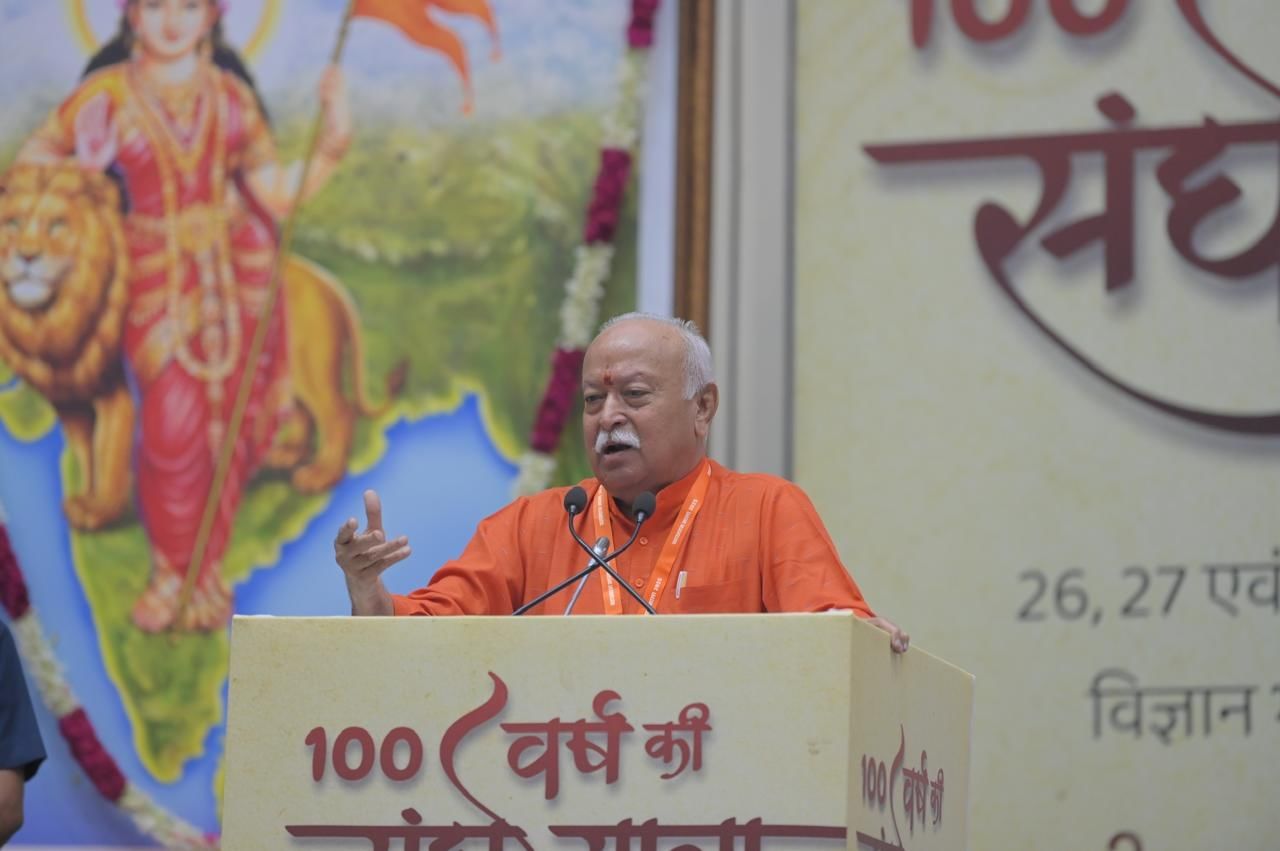“Lot of discussion takes place about Sangh but most of it is not based on facts or authentic information – not to convince but to tell the facts the similar interaction was organised in 2018 at the same venue.”
“The world comprises numerous nations, and the globe has drawn closer in its interconnectedness. Yet, although the life of the world is singular and humanity is one, it is by no means homogeneous. This diversity manifests itself in its own distinctive shades and expressions.” “The raison d’être (purpose of formation) of the Sangh is Bharat; the very course of its functioning is Bharat; and the true significance of the Sangh lies in elevating Bharat to the stature of a world preceptor (Vishwaguru).”
“Dr. Hedgewar was a patriot by birth. The spark of devotion to the nation had been kindled in his mind since childhood.” “Dr. Sahab went to Calcutta, pursued medical studies, and also established connections with the Anushilan Samiti. He is mentioned in the writings of Trilokyanath Chakravarti and Rasbihari. His code name was ‘Koken’.” “One who is of unimpeachable character, who remains in constant communion with society, who enjoys its implicit trust, and who is prepared to dedicate his very life for its cause, such a leader is required. From the very fabric of his life an atmosphere of inspiration emanates. It is such heroes that must be nurtured and shaped. Rabindranath Tagore has written of this with utmost clarity.”
“Dr. Hedgewar undertook an experiment and, following its success, engaged in deliberations on the matter. The conceptual germination of the Sangh had, in fact, taken place several years earlier; however, it was only after the Vijayadashami of 1925 that he made its formal proclamation.” “In Hind Swaraj, Mahatma Gandhi wrote that long before the advent of the British, our nation was one and united. The existence of our country is of a time honoured lineage. Circumstances may change, but its essential unity remains unaltered.”
“In the sacred words of Guru Nanak Dev, we find the following profound words: ‘ख़ुरासान खसमाना किया, क िंद़ुस्तान डराया’. In these lines, Guru Nanak Dev vividly portrays the tyranny of Babur, remarking that neither the chastity of Hindu women was safeguarded, nor was the honour of Muslim women spared.”
“The journey of the Sangh has now completed a century. The very purpose of establishing and sustaining the organisation needs to be understood—why was the Rashtriya Swayamsevak Sangh founded, what obstacles did it face, how did its swayamsevaks endure every challenge and yet carry its mission forward, and even after completing 100 years, why does it continue to speak of new horizons? If one were to answer this in a single sentence, it is this—the Sangh’s prayer ends each day with the words: ‘Bharat Mata ki Jai’. It is our motherland; its glory must be exalted, and it must attain a pre-eminent position in the world.”
“What is our’s intrinsic dharma? Harmony, not conflict.” “For 40,000 years, the DNA of people of Bharat – living in Akhand Bharat – is same. Our culture and worldview is same – of living with coordination.”
“The relationship between Sangh and Swayamsevaks is unbreakable, and of births and rebirths.”
“What is to be done? The organisation of society in its entirety. The organisation of the entire Hindu society. By the term ‘Hindu’, it must not be inferred that it implies ‘Hindus versus all others’; certainly not. The word ‘Hindu’ connotes inclusiveness.” “In our prayer, we say — ‘किजेत्री च नः सिं ता िाययशक्तिर्’ (Vijetri cha nah samhata karya-saktir – May our collective strength ever be victorious and effective in action)”
“During a press conference, Guruji was asked, ‘In our village there are no Christians or Muslims; then what purpose does the shakha serve here?’ Guruji replied, set aside your village for a moment, if had there been no Christians or Muslims anywhere in the world, yet if the Hindu were to remain in his present condition, there would still have been a need for a shakha such as that of the Sangh. An organisation does not exist in opposition to anyone.”
“The Sangh’s work has always been to organise and unify society, and it has carried forward this mission for nearly a hundred years.” “When we speak of a Hindu Rashtra, it is not to exclude anyone. The Sangh did not arise in opposition to others or as a reactionary force.” “No voluntary organisation has faced such intense, prolonged, and harsh opposition as the Sangh.” “In terms of its cadre, resources, and scope, the Sangh remains self-reliant.”
“In this Country, Hindus, Muslims, Buddhists, and others shall not engage in mutual conflict; they shall live in this very country and, in this very country, they shall take their last breath.” “The Sangh shall be steered by its own Swayamsevaks; we are not dependent on others.
